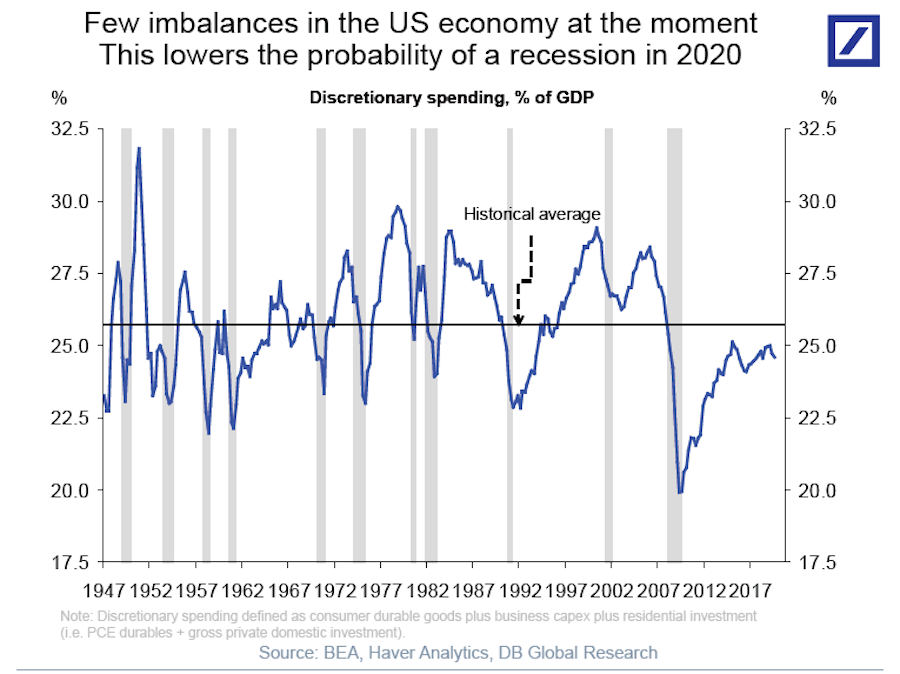Why the U.S. economic expansion could continue for years: Morning Brief
Thursday, January 2, 2020
Get the Morning Brief sent directly to your inbox every Monday to Friday by 6:30 a.m. ET. Subscribe
Why Wall Street is calling for no recession in 2020
In 2019, the word on the tip of everyone’s tongue was “recession.”
A U.S.-China trade war, an inverted yield curve, and the length of the expansion were just a few of the concerns cited by investors who were still skittish following the market’s worst year since the crisis.
But easier Fed policy, a softening in the trade war, and better-than-feared economic data helped power the stock market’s best year since 2013.
And as we enter a new decade, economists across Wall Street are starting to discount not only a recession in 2020, but in the years ahead.
In a note to clients published last week, economists at Goldman Sachs answered the 10 most pressing economic questions heading into the new year.
Among them: Will the economy enter recession in 2020?
“No,” Goldman writes.
“While trade war-related recession fears have faded in financial markets, broader worries remain,” the firm adds.
“The current expansion is now the longest in US history, and some recession fears may simply reflect an instinctive sense that its time must surely be almost up. This has not been an unreasonable thought historically, as the two usual late-cycle risks — inflationary overheating and financial imbalances — often did grow over time. But so far both risks look limited.”
Fed chair Jerome Powell has stressed in recent public comments that inflation pressures have been “unexpectedly muted” relative to the Fed’s 2% target. And until there is a material pickup in inflation, Powell expects the Fed’s “somewhat accommodative” policy stance will remain in play.
When it comes to financial imbalances, data has consistently shown this economic cycle to be one of consumer deleveraging. And with consumer spending accounting for about 70% of GDP, the relative financial health of consumers is tantamount to the health of the economy.
Though as Deutsche Bank’s chief international economist Torsten Sløk notes, corporates have also exhibited a similar caution compared to history. This further suggests this economic cycle — though it is up there in years — shows few signs of breaking down.
“This expansion has been characterized by an extreme degree of caution among consumers and corporates,” Sløk said in a note published this weekend.
“Because of the experience in 2008-2009, households and companies have been hesitant to spend too much money and take too much risk. As a result, ten years into this expansion, discretionary spending for consumers and corporates is still below its historical average.”

Sløk notes that consumer caution is “highly unusual” compared to the economic cycles we’ve grown accustomed to seeing since World War II.
“The lack of willingness to spend on consumer durables and corporate capex is also the reason why this expansion has been so weak,” Sløk adds.
“And it is also the reason why this expansion could continue for many more years; we are simply less vulnerable to shocks in 2020 because there are few imbalances in the economy.”
By Myles Udland, reporter and co-anchor of The Final Round. Follow him @MylesUdland
What to watch today
Economy
Initial Jobless Claims, week ended December 28 (222,000 expected, 222,000 prior); Continuing Claims, week ended December 21 (1.719 million prior)
Bloomberg Consumer Comfort, week ended December 29 (62.3 prior)
Markit US Manufacturing PMI, December final (52.5 expected, 52.5 prior)
Top News
China sets policy pace for 2020 with reserve cut to aid credit [Bloomberg]
Trump's tariffs are backfiring on the U.S., Fed finds [Yahoo Finance]
Ghosn met Lebanese president after fleeing Japan: sources [Reuters]
California’s new data privacy law will change the internet [Yahoo Finance]
YAHOO FINANCE HIGHLIGHTS
Here's what in the new law taking on the 'scourge' of robocalls
College Football Championship ticket prices could become most expensive in history
Bitcoin is a pyramid scheme, economist says
Follow Yahoo Finance on Twitter, Facebook, Instagram, Flipboard, SmartNews, LinkedIn, YouTube, and reddit.


